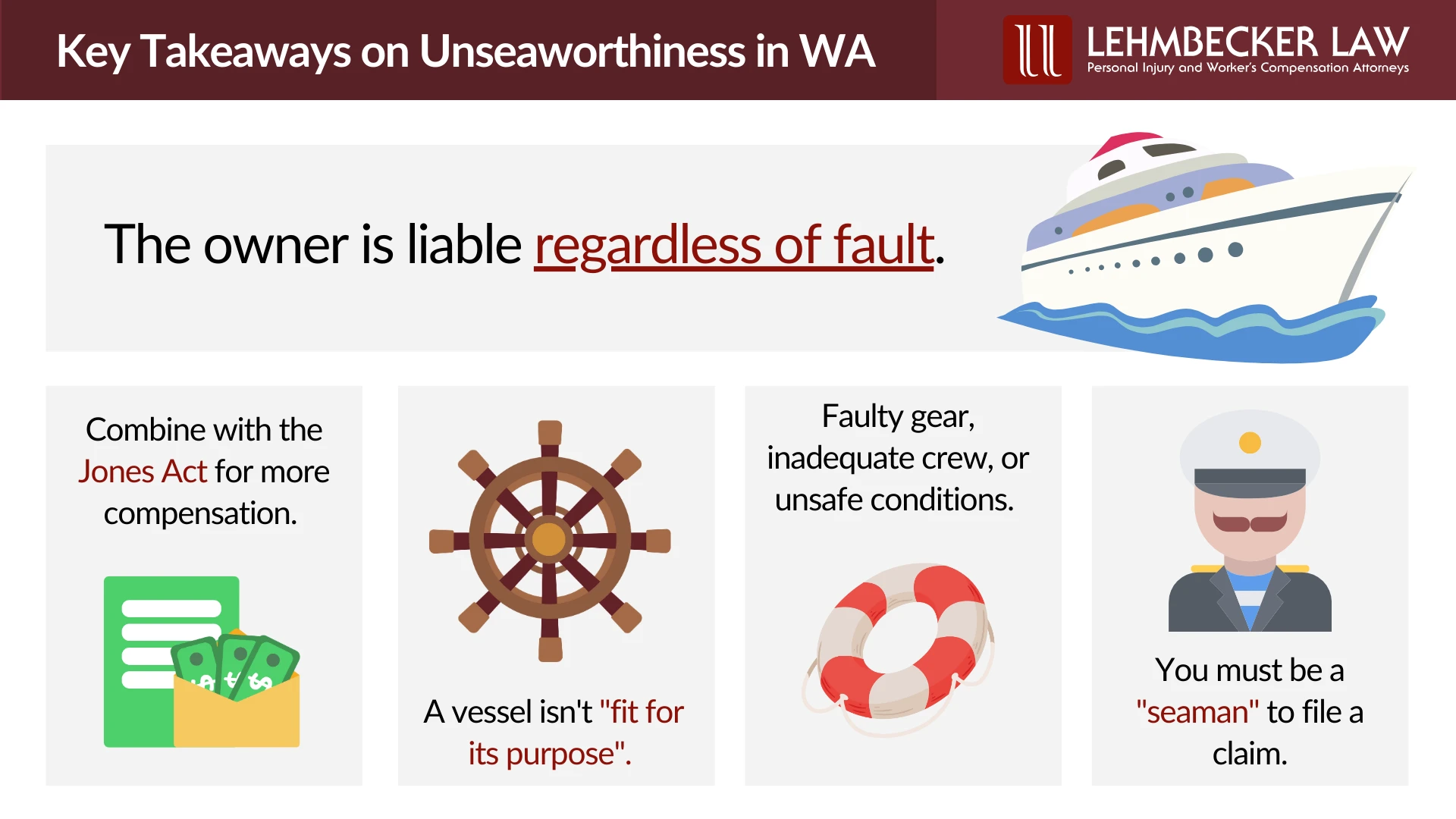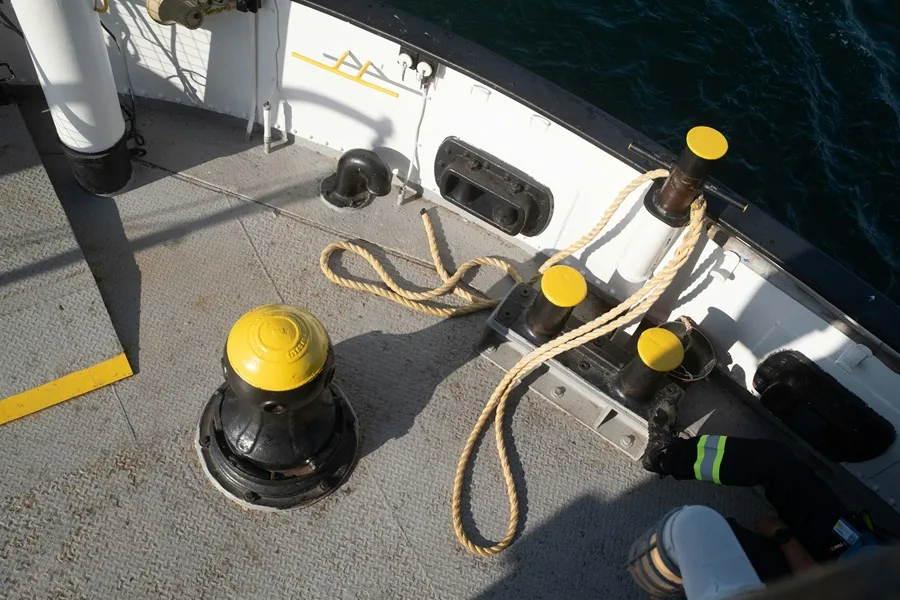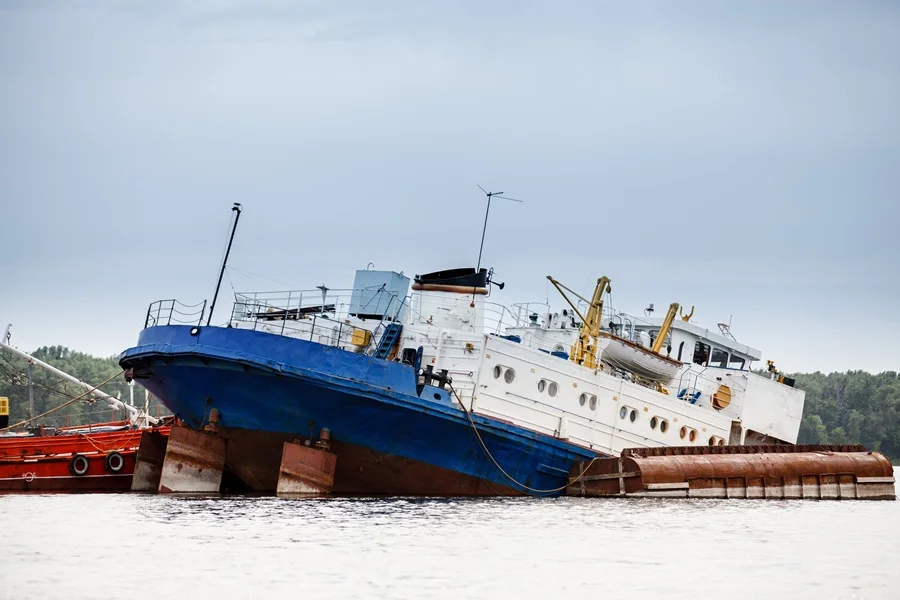There is no fee unless we win!
EN

- EN
- ES


Being involved in an accident aboard a boat is scary, but once the initial emergency has passed, you may find the aftermath to be even more anxiety-inducing. Figuring out how to move on with your life when you have to deal with an injury can be extremely difficult, and you deserve help.
In this blog post, our Seattle maritime injury lawyers will explain what unseaworthiness means, how it relates to maritime injuries, and how a lawyer can help.

The doctrine of unseaworthiness is a core principle in maritime law that imposes an absolute duty on vessel owners to provide a seaworthy vessel. Unlike negligence claims under the Jones Act, a part of the Merchant Marine Act, unseaworthiness claims operate under strict liability, meaning you don't need to prove the vessel owner knew about the dangerous condition or acted carelessly.
According to general maritime law, a seaworthy vessel must be "reasonably fit for its intended purpose" and adequately equipped for its mission. This includes having:
When any of these conditions fail and contribute to a seaman's injury, the vessel owner's duty has been breached, and the vessel may be deemed unseaworthy.
While both unseaworthiness and Jones Act claims protect injured maritime workers, they operate under different legal principles and offer different remedies.
Most injured seamen benefit from pursuing both unseaworthiness and Jones Act claims together. Since the same incident often involves both unseaworthy conditions and employer negligence, combining claims provides multiple paths to recovery and strengthens your overall case.
Maritime workers who qualify for seaman status can pursue unseaworthiness claims alongside Jones Act negligence claims, often resulting in greater compensation than pursuing either claim alone. To pursue an unseaworthiness claim, you must first qualify as a seaman under maritime law. Seaman status requires:
Maritime workers who typically qualify as seamen include:
Common examples of unseaworthy conditions include.
An unseaworthy claim can be based on the vessel's inadequate equipment. This can include:
An unseaworthy claim may also arise from an incompetent or improperly trained crew. Such issues could be:

The physical condition of the vessel itself can be the basis for an unseaworthy claim if it creates a hazardous environment:
Hazards within the work environment can also render a vessel unseaworthy, especially when they stem from unsafe practices or conditions:
While these are not the only examples of unseaworthiness, they account for the majority of cases. To learn whether your case qualifies, even if it doesn't seem to fit with these examples, you should get a lawyer's help.

Unseaworthiness claims under general maritime law allow for more extensive damages than Jones Act claims alone. Available compensation may include.
Economic damages cover the monetary losses you experienced. This includes your medical expenses (past, present, and future bills), lost wages from the time you couldn't work, and lost earning capacity for future income affected by permanent limitations. It also covers the cost of vocational retraining if you need a new career and a daily living allowance to help with expenses while you recover.
These damages compensate you for non-monetary losses. They include compensation for pain and suffering and mental anguish (emotional distress). You can also receive damages for loss of enjoyment of life (inability to do hobbies) and disfigurement (permanent scarring or disability).
Sometimes, additional remedies are available. Loss of consortium is a claim that family members can make for the loss of your companionship. Maintenance and cure are no-fault benefits that cover a seaman's living expenses and medical care during recovery.

Successfully establishing an unseaworthiness claim requires demonstrating three essential elements.
Maritime injury claims are subject to strict time limitations that can affect your right to compensation. In Washington State:
Acting quickly is essential to preserve your legal rights and ensure evidence remains available for your case.
If you've been injured while working aboard a vessel, don't wait to seek legal representation. At Lehmbecker Law, our experienced and dedicated maritime lawyers represent injured maritime workers throughout Washington, securing significant compensation for medical bills, lost income, and other damages.
Your maritime injury case is too important to handle alone. Our law firm provides free consultations to evaluate your case and explain your legal options under federal maritime law. Contact us for your free consultation and learn how we can help you seek compensation for your maritime injury.

Lehmbecker Law's skilled maritime injury attorneys in Washington State will fight to recover your medical bills, lost income, pain and suffering, and other damages available under general maritime law.